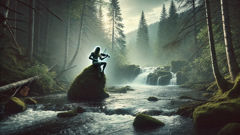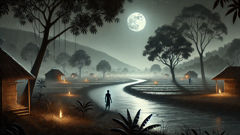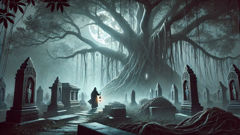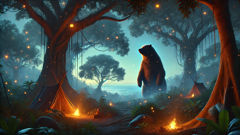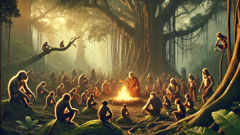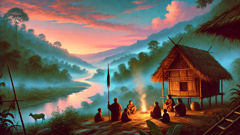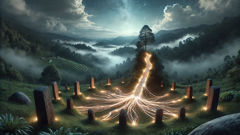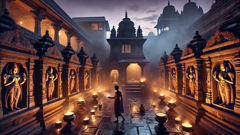Introduction
In the deep green heart of Norway, where pine and birch press close to the rushing rivers and the morning mist lingers long after sunrise, stories move with the wind and settle like dew on mossy stones. There, among the winding streams and thick forests, people have always whispered about things unseen—mysterious beings who move with the current, flicker in the shadows, and play music that stirs the soul. Of all these tales, none is more haunting than that of the Fossegrim, the water spirit whose fingers conjure melodies from a fiddle, whose song can make the mountains dance and the trees bend to listen. The Fossegrim dwells by the hidden waterfalls and shaded pools, his hair tangled with riverweed, his eyes reflecting the river’s secrets. He is both feared and longed for—a symbol of the wild magic that thrums beneath the ordinary life of the village. To those brave or desperate enough to seek him out, he offers a gift few can refuse: the power to play music as no human ever could. But his art is not given freely. A price must be paid, a sacrifice left on the wet stones at the water’s edge. In the Norway of the 19th century, where old beliefs linger alongside the new, this legend is more than a bedtime story. It is a warning and a promise, as real as the roar of the rapids and the hush of the northern woods. In such a place, under a sky that stretches pale and endless, one boy’s longing for music will draw him deep into the heart of this ancient mystery—and what he finds there will echo through the generations.
Whispers by the Water: Ola’s Longing and the Village Shadows
Ola Pedersen was born beneath the shadow of the high fjell, in a village where life measured itself in seasons and the state of the river. His father was a woodcutter, his mother a weaver, and their home always smelled of pine resin and wool. But Ola’s heart beat to a different rhythm. From the time he could walk, he was drawn to the sounds that filled the air—the trickle of rain along the eaves, the wind singing through the spruce, the lilt of distant cowbells. Most of all, he loved the fiddlers who played at weddings and midsummer dances, their tunes swirling with wildness and sorrow. It seemed to Ola that music was a kind of magic, and he wanted nothing more than to wield it himself.
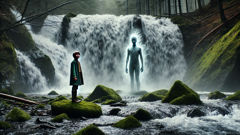
Yet in his hands, the old fiddle his uncle had carved from birch would not obey. The notes skittered away like frightened trout. The villagers laughed gently at his efforts, but Ola burned with shame and yearning. He haunted the woods at dusk, practicing until his fingers ached, listening for anything—any secret—that might unlock the music within him.
It was on one of these twilight wanderings that Ola first heard the rumor from Ingebjørg, the wise woman who lived near the edge of the forest. She spoke in a hush, her voice as rough as river stones. “Some things in these woods are older than us, boy. Older than the church, older than the king. There are spirits who walk where men do not. If you want what no mortal can teach, you must seek the Fossegrim, the fiddler who lives by the falls.”
Ola shivered, remembering tales told by firelight—of the Nøkk, who lured children into the water; of hulderfolk, who danced on moonlit hills. But something in him—a hunger fiercer than fear—would not let go. That night, lying on his straw mattress, he listened to the river’s roar and dreamed of music that could make even the stone-faced mountains weep.
Days passed in a haze of longing. Ola’s family, used to his absences, thought little of it. Only his younger sister, Mari, noticed the new intensity in his eyes. “Don’t go too far,” she warned one morning as he set out with his fiddle slung over his shoulder. Ola smiled, tousled her hair, and promised nothing. The river called to him louder than any human voice.
He followed deer tracks through the thickening trees, climbing over tangled roots and under drooping boughs. The air grew cooler, the light dimmer. The further he went, the more the world seemed to shrink into shades of green and gray. He passed moss-covered stones that looked like sleeping giants, and once he startled a heron that rose with a scream and vanished into the mist. At last, he heard the thunder of falling water and felt the fine spray on his face. The Fossegrim’s lair.
The pool beneath the falls was black and deep, swirling with eddies. Strange patterns gleamed just beneath the surface. Ola stood at the edge, heart pounding, his uncle’s old fiddle gripped tight. He remembered Ingebjørg’s words: “You must bring a gift—something the Fossegrim desires. A slab of fresh mutton, left on a Thursday night, just as the sun dips below the trees. Only then will he listen.”
Ola had brought nothing but a heel of bread. His hope flickered, but desperation burned brighter. He knelt and placed the bread on a flat stone, then played the only tune he knew, raw and stumbling but filled with longing.
At first, there was only the roar of water. Then, beneath it, another sound—a thread of music so pure it made Ola’s breath catch. The air shimmered. From the spray, a figure took shape: lean and lithe, with hair like riverweed and eyes the color of winter sky. The Fossegrim.
“Why do you disturb my music, human child?” The voice was neither cruel nor kind, but old as the water itself.
Ola tried to speak but only managed a whisper: “Teach me.”
The Fossegrim eyed the bread, a wry smile flickering. “Bread is poor fare for a spirit. But longing is its own kind of offering.” He reached out a hand, webbed and pale. “Do you truly wish to play as I do? There is a price.”
Ola nodded, heart thundering. He felt the pull of something vast and ancient, a current stronger than fear. The Fossegrim’s fingers brushed his own. The world spun. Music burst into Ola’s mind—a flood of notes, wild and beautiful, as untamable as the river itself.
A Bargain in Moonlight: Sacrifice and the Price of Music
Ola staggered back, blinking away the wild visions that crashed through his thoughts. The Fossegrim regarded him with a strange mixture of pity and amusement. "You hunger for music—so do many. But most will not pay what is required. The river keeps what it is owed."
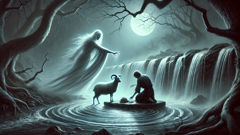
A chill crept up Ola's spine. He remembered all the warnings: that bargains with spirits never favored mortals, that the Fossegrim's music could drive men mad or make them pine for water until their dying breath. Still, his desire burned too fiercely. "What must I give you?" he asked.
The spirit gestured to the rushing pool. "The finest mutton, laid upon these stones. It must be fresh—so fresh that blood still stains the moss. If you bring it at dusk, on the seventh Thursday from now, I will give you my gift in full. Until then, you may practice—but beware: every song you play will taste of longing until the bargain is fulfilled."
Ola left that place with his mind swirling. The music in his head was sharper than ever—a tune he could almost play, if only his fingers would obey. Each day he toiled with his uncle's fiddle, coaxing melodies from its stubborn strings. His family noticed how he changed—how shadows grew beneath his eyes, how he flinched at loud noises, how he seemed to listen always for something no one else could hear.
He saved every coin and scrap of food he could spare. On market days, he watched the sheep pens with hungry eyes, thinking of the sacrifice he would need. The villagers whispered that Ola had grown odd—haunted. Some warned their children not to follow him into the woods.
At last, the seventh Thursday arrived. Ola rose before dawn and slipped through the silent house. He carried a bundle wrapped in linen—a slab of mutton bought with nearly all his savings. He walked through the forest, heart pounding, as gray dawn bled into day. The river roared louder with every step.
At the falls, mist curled around his ankles. He unwrapped the mutton, its flesh red and slick, and placed it on the stone where he had first met the Fossegrim. The spirit appeared as before, woven from spray and shadow.
"You have brought the price," said the Fossegrim, voice rippling like the water. "Now, let us begin."
The lesson was nothing like Ola had imagined. The Fossegrim drew him close, placing Ola’s hands in the icy water until his fingers went numb. "Feel the current," he commanded. "Let it flow through you. Music is not learned—it is taken from the world itself."
The spirit guided Ola’s hands over the fiddle, pulling notes from the wood that shimmered like moonlight on water. Ola played until his hands ached and tears streamed down his face, the music rising and falling in wild patterns he could barely follow.
"This gift comes with a wound," murmured the Fossegrim as dawn broke and birds began to sing. "You will play as no mortal ever has—but every song will remind you of what you have given. There will be joy, but also sorrow. The river’s gift is never free."
Ola staggered home, fingers stained blue from cold and eyes dazed. He slept for days, feverish with dreams of churning water and dancing notes. When he woke, everything had changed. His family stared in awe as he played tunes that made their hearts race and their feet dance. Word spread through the village like wildfire: Ola Pedersen had become the finest fiddler in all the valley.
But Ola’s heart was never quite at ease. Sometimes, when he played alone by the river, he would see the Fossegrim’s reflection smiling up at him from the dark water, and he would remember the bargain struck in moonlight.
Conclusion
The years passed like leaves on the river, swift and silent. Ola grew into a man and never set aside his fiddle. His music became legend—tunes that could heal a broken heart or draw laughter from the sternest farmer. People journeyed from distant valleys just to hear him play beneath the great spruce on festival nights. Yet even in joy, there was always a sliver of something wild and sorrowful threading through his melodies. Those who listened closely said they could hear the rush of water, the cry of distant birds, and sometimes—just sometimes—the faint echo of a spirit’s laughter.
Ola married and had children of his own, and when he played for them by the hearth, his fingers moved with a life of their own—quick, sure, sometimes trembling when a certain note called forth memories of icy water and moonlit bargains. He told his children the story of the Fossegrim not as a warning but as a reminder: that nature is alive, that beauty can be both gift and burden, and that every art has its cost.
On misty mornings, villagers would sometimes find Ola sitting alone by the riverbank, his music drifting out over the water. Some said they saw another figure there beside him—a shape woven from mist and spray, listening with a secret smile. And so the legend lived on, passed from lips to eager ears, woven into the very fabric of Norway’s wild places.
To this day, when the rivers run high and the wind carries strange music through the forests, there are those who say the Fossegrim still plays—waiting for another soul brave enough to seek his gift and pay his price.

